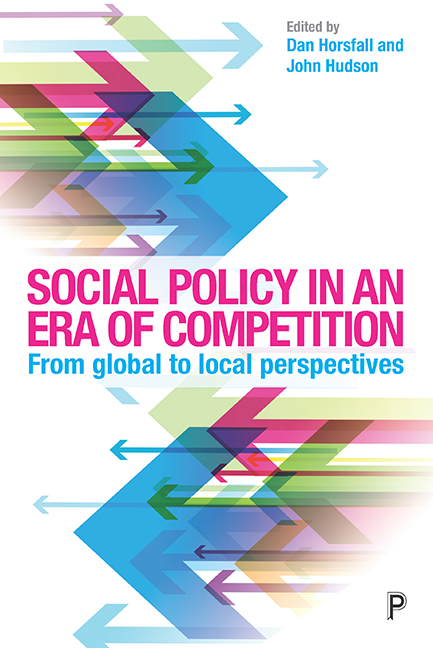Book contents
- Frontmatter
- Contents
- List of figures, tables and boxes
- List of contributors
- List of abbreviations
- Introduction: social policy in an era of competition
- Part One Global competition as the context for welfare
- Part Two The impact of intensifed competition on local governance
- Part Three The reframing of welfare discourses in an era of competition
- Part Four Conclusions
- References
- Index
five - Delivering fuel poverty objectives within the context of globalised energy markets
Published online by Cambridge University Press: 05 April 2022
- Frontmatter
- Contents
- List of figures, tables and boxes
- List of contributors
- List of abbreviations
- Introduction: social policy in an era of competition
- Part One Global competition as the context for welfare
- Part Two The impact of intensifed competition on local governance
- Part Three The reframing of welfare discourses in an era of competition
- Part Four Conclusions
- References
- Index
Summary
Introduction
Fuel poverty, driven by the interaction of low incomes, poor energy efficiency and high energy prices, has been an explicit policy concern since the 1990s (DECC, 2012a). However, fuel poverty policy sits within the wider context of energy, much of this dependent on global energy markets, regulation of multinational companies and political decisions about how and where to levy social and environmental initiatives.
This chapter explores claims made by policy makers in the UK that, despite having no control over global energy markets, existing policy protects households vulnerable to fuel poverty through the regulation of commercial energy suppliers and specific policies that provide cash transfers and energy-efficiency measures. In so doing, it offers a pertinent case study of the challenges policy makers face when trying to reconcile local social policy objectives with the pro-competition, pro-global market policy frameworks that increasingly characterise the once predominantly state-owned utilities such as water, energy and transport. It is argued that exploring fuel poverty policies in the context of the operation and regulation of (globalised) energy markets can tell us much about how discrete areas of social policy do and might proceed in an era of global competition. Keeping energy prices low is an essential part of the UK government's approach to fuel poverty alleviation, but, as argued below, this task is a complex one in which the steering capacity of the nation-state often seems weak and its capacity hollowed out (see Cerny and Evans, 1999; 2004). This is exacerbated by a neoliberal policy direction that funds environmental and social policy measures through charges on energy bills rather through tax-funded programmes.
The chapter argues that existing policy has been somewhat contradictory in its view of the government's power to steer energy markets: while the Department for Energy and Climate Change suggested that the UK has no control over the global energy market, this does not match political rhetoric, which has emphasised the importance of increasing domestic energy security in order to spread risk and reduce dependence on politically unstable fossil fuelproducing states, and has also seen political pressure placed on the six main energy companies to lower energy charges to consumers.
- Type
- Chapter
- Information
- Social Policy in an Era of CompetitionFrom Global to Local Perspectives, pp. 85 - 102Publisher: Bristol University PressPrint publication year: 2017



